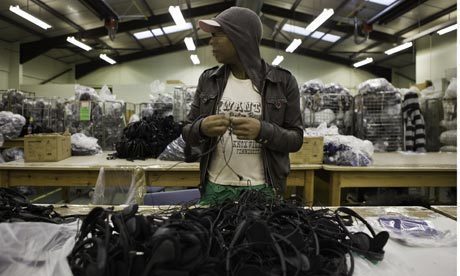Slavery or rehabilitation? The debate about cheap prison labor, explained.
Source: http://www.vox.com/2015/9/7/9262649/prison-labor-wages
Tens of thousands of Americans are paid far below the minimum wage, sometimes less than a dollar for an hour’s work — and it’s totally legal and constitutional.
How? Because the work takes place in prison.
 UNICOR, a government-owned company that uses federal prison labor, pays workers anywhere between 23 cents and $1.15 an hour. And it has a lot of employees: In 2007, the Congressional Research Service estimated that 19,720 federal inmates — about 18 percent of the federal prison population — work for UNICOR.
UNICOR, a government-owned company that uses federal prison labor, pays workers anywhere between 23 cents and $1.15 an hour. And it has a lot of employees: In 2007, the Congressional Research Service estimated that 19,720 federal inmates — about 18 percent of the federal prison population — work for UNICOR.
The pay is even worse in some state prisons. In Texas, for example, a great majority of prisoners aren’t paid at all, yet they’re often coerced into labor with the threat of further punishment. On average, prison laborers are paid 93 cents an hour, according to the Prison Policy Initiative.
This seems exploitative — and many prisoners’ rights advocates say it is. But it can also play an important part in making sure an inmate doesn’t end up back in prison.
Critics of prison labor compare it to slavery — and complain about the unfair competition
The low wages have led to many comparisons between prison labor and slavery. Alex Friedmann, the managing editor of Prison Legal News and a prisoners’ rights advocate, described prison labor as “strictly exploitation” to Vice News, referencing public-private partnerships in Colorado that let companies like Whole Foods, for example, use inmates for agricultural labor for as little as 74 cents a day. And with black people disproportionately likely to be incarcerated, there are racial disparities in this often forced, low-paid labor. (It of course didn’t help that the Virginia Supreme Court said prisoners are “slaves of the state” in 1871, six years after slavery and involuntary servitude were abolished by the 13th Amendment except as punishment for a crime.)
But cheap prison labor can also hurt workers who aren’t in prison. Since prisoners are paid so little — far below the minimum wage — they are a much cheaper option for private companies and government contracts.
Factory owners, for example, have complained that they can’t compete with UNICOR in bids for government contracts. “We pay employees $9 on average. They get full medical insurance, 401(k) plans, and paid vacation,” Kurt Wilson, an American Apparel executive, told CNN Money in 2012. “Yet we’re competing against a federal program that doesn’t pay any of that.”
But prison labor might help rehabilitate inmates
Although it seems exploitative, advocates for cheap prison labor argue that it can benefit prisoners by giving them a sense of what full-time work is like. And if it cost governments the actual minimum wage, these programs might get too expensive for prisons already strained by costs due to mass incarceration — which means few or no inmates would get paid at all.
“Ninety-seven percent of all offenders that come into prison will get out, and there’s famous saying, ‘pay me now pay me later,'” Dennis Dunsmoor, director of the Colorado program that worked with Whole Foods, told Vice News. “These guys are going to get back out on the street. A lot of these guys have never worked a job, never clocked in, never worked eight hours, and just that skill alone is very valuable, so we teach them that kind of work ethic.”
Some research has backed this up. A study of federal prisoners found inmates who took part in UNICOR were 24 percent less likely to reoffend and 14 percent more likely to be employed a year after their release. Another study of a Florida program found significant increases in employment, but no changes in inmates’ likelihood to reoffend.
There is a problem with this type of research: selection bias. It’s difficult to know whether the inmates participating in prison labor programs are those who are already less likely to reoffend and more likely to get and keep a job after prison — since they’re able and, in many cases, volunteering to work while they’re incarcerated. Some studies try to control for this, but it can never be fully ruled out.
But if prison labor improves an inmate’s chances of reoffending and sustaining employment, there are still moral and ethical questions behind the practice. So the benefits may not justify paying prisoners pennies or nothing at all, but rather make a case for increasing the spending on these programs so everyone can participate and get at least minimum wage.

